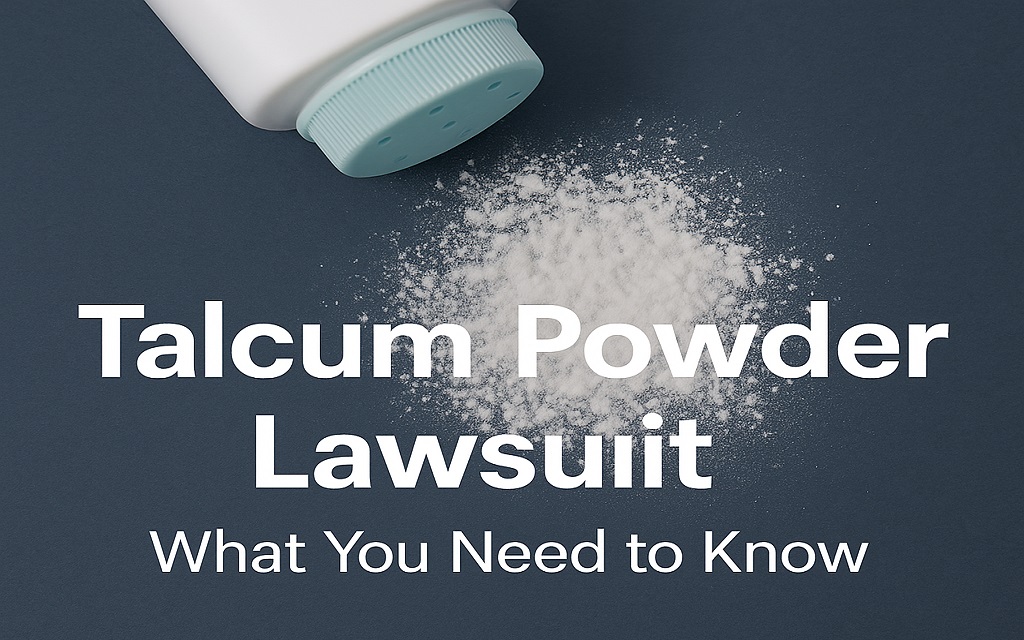You may hear about lawsuits involving talcum powder. You could wonder if they affect you. The truth is simple. People are filing legal claims after developing cancer. The claims focus on Johnson & Johnson’s talc products. You deserve to understand what the talcum powder lawsuit means in 2025. You can learn how it works, who qualifies, and what steps to take.
What Is the Talcum Powder Lawsuit About?
You may have used talcum powder every day. You probably trusted Johnson & Johnson to sell a safe product. However, you now hear about lawsuits linking talcum powder to cancer. You deserve to know the truth.
Thousands of people claim talcum powder caused ovarian cancer or mesothelioma. Many lawsuits say the powder had asbestos. That mineral is a known cancer-causing substance. Courts are now reviewing this legal battle.
Why Are People Suing Johnson & Johnson?
You should understand why so many cases exist. Johnson & Johnson faces over 62,000 lawsuits in federal and state courts. The core claim states that J&J sold talc products while being aware of the cancer risks associated with them.
Internal company records from the 1970s reveal concerns about asbestos. Scientific testing found traces of asbestos in baby powder. Courts ruled against J&J’s bankruptcy move in 2023. That move attempted to limit the amount the company paid victims.
What Products Are Involved in the Lawsuit?
You may have used one of these products:
- Johnson’s Baby Powder
- Shower to Shower
- Other talc-based body powders
Each of these products used talcum powder as a base. That powder sometimes contained asbestos.
Must Read: Talc Powder Ovarian Cancer Lawsuit: What Victims Need to Know
Who Qualifies for a Talcum Powder Claim?
You could qualify if you meet certain conditions. Here are the most common:
- Regular use of talcum powder for personal hygiene
- Diagnosed with ovarian cancer or mesothelioma
- Medical evidence connects your cancer to talc exposure
Family members of deceased victims may also file claims. States allow this under wrongful death laws.
What Do Courts Say About Talcum Powder and Cancer?
You should be aware that science plays a crucial role in the lawsuits. Several studies show a clear pattern.
The American Cancer Society has flagged talc as a possible cancer risk. A 2020 meta-analysis showed a 33% increase in ovarian cancer after long-term genital use. The FDA confirmed the presence of asbestos in talc samples in 2019.
These findings support the claims. Still, Johnson & Johnson denies any wrongdoing.
How Are the Lawsuits Organized in Court?
The lawsuits now fall under MDL 2738. That stands for Multi-District Litigation. It helps organize similar lawsuits into one federal court. This streamlines legal processes and standardizes the workflow.
The MDL court sits in New Jersey. Bellwether trials are expected to begin later in 2025. Those early trials help predict future outcomes.
What Past Verdicts Set Legal Precedents?
Several verdicts already show how severe the cases can be. Here are a few examples:
- $260 million awarded to 22 women with ovarian cancer in Missouri (2018)
- $15 million awarded to a mesothelioma victim in California (2020)
- $320 million in combined damages in another major case (2023)
Each of these results demonstrates how juries respond when firm evidence is presented.
What Kind of Settlement Can You Expect Next?
You may wonder about compensation. Legal estimates vary by case. But experts expect the following average ranges:
- $100,000 to $500,000 for ovarian cancer claims
- $300,000 to over $1 million for mesothelioma claims
Factors include how long you have used the product, your age, your medical records, and how your cancer impacts your life.
What Legal Steps Should You Take Now?
You should act quickly. Here is what to do:
- Get a medical diagnosis and complete records
- Speak with a talcum powder lawyer
- File your case as soon as possible
Statutes of limitation apply in every state. Most deadlines begin at the time of diagnosis. Some states only allow two years.
What If You Used Talc Products Decades Ago?
You can still file a lawsuit if you meet the criteria. Talc-related cancer can take decades to appear. Some women used talc in the 1980s and developed cancer only recently.
The law often allows cases to be based on the date of diagnosis, rather than the date of use. You should ask a lawyer about your timeline.
What Is the Impact of the Talcum Powder Lawsuit?
You should care because this lawsuit sets a precedent for future legal standards. Johnson & Johnson has already paid billions to defend these claims. If plaintiffs continue to win trials, the company may reach a global settlement.
That would affect future product safety, corporate responsibility, and cancer prevention. The outcome could also reshape product labeling laws.
FAQs
Can you still buy talc powder?
No. Johnson & Johnson pulled talc powder from North American shelves in 2020. The company removed it worldwide in 2023.
Are lawsuits still open in 2025?
Yes. The MDL is active. Lawyers continue to accept new clients.
Is this a class action case?
No. This is a mass tort case. Each plaintiff files individually but joins the MDL to streamline proceedings.
Do you need to go to court?
Not always. Most cases settle out of court. Your lawyer can guide you.
Can you file on behalf of a loved one who died?
Yes. Many states allow wrongful death claims.
Conclusion: What Should You Do Right Now?
You should not wait. Delays may harm your legal rights. Evidence and records matter.
You may qualify even if you used baby powder years ago. Cancer takes time to appear. The law considers this.
It is smart to speak with a lawyer now. A case review is free. You only pay if you win or settle. That means you have nothing to lose. Get your talcum powder lawsuit 2025 case reviewed today.
Disclaimer: This article provides a general overview of the Talcum Powder Lawsuit, based on publicly available information, and is intended for informational purposes only. It does not constitute legal advice.
Musarat Bano is a content writer for JudicialOcean.com who covers lawsuits, legal news, and general legal topics. Her work focuses on research-based, informational content developed from publicly available sources and is intended to support public awareness. She does not provide legal advice or professional legal services.




